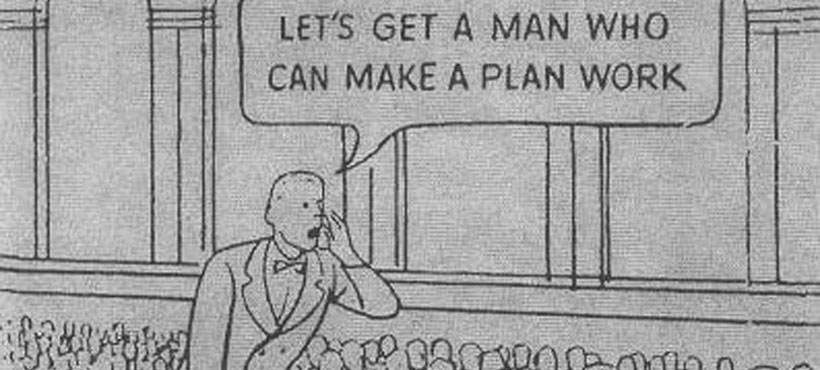A System That Gets Society What It Wants
EconTalk host Russ Roberts had an interesting discussion with economist Mariana Mazzucato, with some foundational differences of opinion between the two. Mazzucato’s contention, as the EconTalk summary puts it, is that “economists have mismeasured value and have failed to appreciate the role of government as innovator.” It’s the “government as innovator” piece that sticks in the craw of free-marketers like Roberts (and me).
As compelling as the debate may have been, though, the two seemed to talk all around a central point. Namely, when we’re talking about government behaving like a big company — investing in innovation, taking shares of profits to cover losses in other investments, and so on — we’re not really talking about government and corporations as implicitly different organizations. There’s no mystical force that gives government a different incentive structure from for-profit companies. All we’re talking about the way each organization makes decisions.
The key question, then, is what makes government’s structure preferable as a system for investment in innovation. Roberts did tread some of this turf by asking who picks the goals. And who judges what was a success? Was it worth it to go to the moon, for example? Who says?
Mazzucato thinks politicians ought to run on their proposals for big projects (as if the question of whom to elect isn’t complex and muddy enough). Alexandria Ocasio-Cortez, she says, should have been elected explicitly to invest in greening the economy and climate change. Mazzucato isn’t even all that sure it matters whether government hits its targets, as long as it generates innovation and produces valuable side effects.
What this point of view seems to miss (and what Roberts didn’t seem to catch) is the basic value that government has brought to these massive projects: It has acted as the conduit for public enthusiasm, whether it was winning World War II or reaching the moon. Politicians can maybe whip the public into a frenzy for some objective that isn’t actually urgent, but that is by necessity a social contagion, not a flame that can be built into the machine of government for the duration. The force actually goes in the other direction: When the population really wants something, it uses government to push over obstacles.
The ability to push over obstacles, in other words, is government’s unique capability, and that is a capability that we should resist every temptation to turn into an ongoing principle. (Jonah Goldberg has written often that progressives want the country always to be on a war footing, making every pet cause “the moral equivalent of war.”) The wanting should come first, and government should be a mechanism of last resort, with many barriers, when the people really, really want the thing in huge consensus.
Stepping back, we can suggest that, when society is enthusiastic, it creates the systems it needs to achieve its goals. If it is not enthusiastic, those systems fall apart or fall into corrupt hands, and we get bad socialism. For all her emphasis on process, it’s somewhat surprising Mazzucato doesn’t think to the next, less tangible (less manageable) step, and her discussion of trade unions offers a good illustration of what I mean.
Mazzucato insists that “labor unions” brought about the eight-hour work day, weekends, the end of child labor, and more. Roberts counters with his belief that those things would have happened anyway; they happened more because society was ready for them and able to accommodate them than because somebody invented the labor union. I’d add that the labor unions were just the way in which workers secured things that were primed to happen based on economic circumstances. They helped to (again) knock down some barriers and overcome market inertia.
But that doesn’t mean that there’s something in the structure of labor unions as they were conceived at that time that should universally apply or that makes their organizational structure or leaders particularly valuable at any given board table. Indeed, when unions are institutionalized, the leaders’ interests diverge from the members’ and align with those of other managers, and the organization’s power becomes disproportionate.
In both cases, government and unions, the question that has to be asked is how we can make it possible for groups or individuals to find innovative ways to express their collective and individual interests in any given circumstance, without knowing in advance what those circumstances will be or what the goals will be or who the players will be or what the obstacles will be. And probably as important is a mechanism for dissolving the systems we build for specific goals so that they don’t disrupt society when their purpose has been served.
Of course, it may be that we already do this pretty well. We used government to win World War II and to get to the moon, and despite their massive pressure, we’ve so far resisted treating things like “climate change” as justification for reworking civilization. In other words, we don’t have some of the innovation projects that Mazzucato wants because our society has rejected them again and again.
In that light, one might suggest that Mazzucato is essentially making a highly sophisticated argument for shifting power toward people who share her priorities by locking in and extending mechanisms that should more appropriately be discarded. Moreover, the sophistication of her argument is directly proportional to the signals that society has been sending that it’s past time to brush it aside.
Featured image: Screen capture from The Road to Serfdom in Cartoons.




